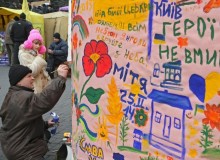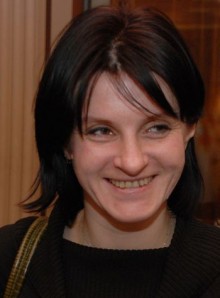In spite of the political decisions of the past weeks and months, the activation of the artistic environment is demonstrative. Whereas previously the mass media complained about insufficient civic stand and marginality of intellectuals, now everyone cares about the problems of the country. The activity of the artistic layer is proof that a kind of a cultural revolution has taken place and new senses have been formed. The Maidan, like a microcosm and model of a great free country, gave impetuses to the process of self-purification, and Ukrainians got an opportunity to look in their own eyes (like during the mirror actions with the police). Marianna Kiianovska very subtly feels and experiences current events. Poetess, prose writer, essayist, translator, and literary critic, she believes in the best, but understands the scale of the problems, sees the gaps, but also has proposals what to do next. Below is the interview with Marianna about multiculturalism of the Maidan, the processes of creating new senses, as well as the collision of two civilizations – the archaizing and the modernizing.
The revolution in Ukraine is now called the revolution of mind and a cultural revolution. What do you think?
“Saakashvili very aptly characterized the Maidan. He called these events a geopolitical revolution, which is always a revolution of modernization. When conquerors came to Latin America, in a certain sense, not only the conquering took place, but also the geopolitical and information revolution – adopting of new forms of culture, communication, preserving of information, and new forms of memory. Speaking of Ukraine, these days the modernization aspect of the Maidan is evident. On the one hand, this modernization means transformation, and, on the other hand, it is a consequence of the logical evolution of certain processes.
“We are witnesses and participants of the collision not of two ideologies, but two civilizations – the West and the East. But not in the meaning of classical opposition. For what is the West? To a certain extent it is a transformed, secularized tradition of Protestantism, which is modernizing in its nature. Protestantism emerged in the 16th century, approximately 100 years after Guttenberg invented the printing machine. The connection of Protestantism with book printing is evident, because Guttenberg printed the Bible. So, the Reformation and relative availability of books throws a bridge to the revolutions of the 18th century, and the key ideas of that time are the ideas of Enlightenment, new social moral, etc. And this is totally different from what came to us via Orthodox Christianity from Muscovy before Peter – a state with scarcely developed science, the powerfully rooted tradition of interaction of Orthodox Church in the Muscovian state with the suppressor. The Orthodox clergy not only closely cooperated with the Khan authorities, but practically became part of Mongol-Tatar power in Rus’, opposing any international contacts and impeding the development of science. In a sense, Moscow Orthodox Church conserved the culture for centuries. The specific version of Orthodoxy mastered by Russia imposed on the society the rigid hierarchies, which stood in the way of personal development. This concrete Moscow-Horde Orthodox tradition should not be mixed with Orthodoxy as such, including in Russia itself. But in Ukraine of 2012-14 happened practically ideological crossing of ‘patrimony’ of Moscow patriarch Kirill, the institutions of Ukrainian power at service of the ‘family,’ and some other things which I would call in this context the Horde, or actually ‘new system of the Horde.’
“Yanukovych with his mind and memory is rooted in the specific archaizing structures. He imposed them totally on Ukrainian people, without leaving any choice, breaking the values and traditions of democracy, civic society, and humaneness. The person appointed a state official treated its post as a patrimony. In the time of Yanukovych’s presidency special formulas of the power and special possibilities emerged which depended on the post. The social organization emerged which according to certain attributes is neo-feudalism.”
Can cultures of East and West coexist on the territory of one state?
“Speaking about eastern and western Ukraine, it is true. The cultures and values of the east and west, as well as the center and south, can and should coexist. Now we must deeply reconsider the notion of the nation. In the time of globalization, every third person is a newcomer. S/he is a bearer of something which is not typical of us. But let’s recall Shevchenko’s ‘learn from others, but not reject your own things.’ We should love our own things even more – and not deny other things. The fact the Maidan quickly refused from the mottos which could insult people of other nationalities is a great heroic deed. On the structural level it means formation of new values. Maidan in this sense became a real revolution.
“We suddenly saw that language is not dividing us. For many Ukrainians it became evident that the unity of culture is more than unity of language. The unity with Maidan is shown by Russian-language residents of Kharkiv, Donetsk, Zaporizhia, which clearly identify themselves with Ukraine.
“Ukrainians were accustomed to quite archaized, as for the beginning of the 21st century, notions of the nation and people. Now we are basing our ‘private nationalisms’ on what was said by Bandera and Shukhevych, Lypynsky and Dontsov. I think Ukrainian intellectuals should formalize the new theory of the nation.”
Why does not Ukraine have a decent leader?
“Maidan has shown that there can be many leaders and that certain things can be delegated to groups. Groups in their turn will after some time bring up leaders in their environment and delegate to them the powers, endow with trust, and provide them with support. This is a principle of counteraction of many streams, which fill one channel. One should understand that with time we will have a leader, we are only at the beginning of the river, now it is important to develop it with the help of active interaction of groups. Yanukovych received the power, but he did not perceive it as delegation of powers and responsibility. That is why he was not a leader.
“Maidan is a continuation of the Orange Revolution and at the same time is not. Although the revolution did not solve any set tasks, it formulated a certain model. The process started by the Polish Solidarity modernized the society on the whole. However, if Poland did not enter the European Union, many things would have developed differently. Kaczynski’s policy proved it. Poland managed to enter the EU before the intergrowth of the criminal world and the power took place in it. And in our country this intergrowth took place in the time of Kuchma. Only healthy bureaucracy of the European Union can be the spine able to carry the load of breaking the criminal structures and power in Ukraine. In fact, the mere will of people is insufficient to change the system of corrupted power – we will be helped only by the presence of European observers who will be given real power, and who will be as well effectively controlled.
“We’re facing the threat which not all of us realize. If we don’t ride out the crisis, we will be caught up with Civil War in several years. If we don’t start right now the process of real modernization, mastering of new formulas of social life, in a few years current acute crisis will turn into quite rigid counteraction. The adversity is the worst in the regime which is decaying: it is not quite comprehended and uttered. We need to achieve modernization of above all socio-cultural notions. We can follow, conditionally speaking, the path of the first Christians. The environment of intellectuals should implement the modernization project by sending a message to broader masses. The word is a powerful weapon. If we fail to achieve considerable political decisions and mechanisms of their realization, the main thing is provide the freedom of speech. This will create certain prerequisites for really all-embracing changes. In this Maidan we felt that every person is a country. When you help one person, you’re helping the Maidan. This revolution helped us feel the presence and closeness and connection to other people. And this is the key thing which will not disappear.”
What is your assessment of the first steps of the new power? What needs to be done, so that the Maidan victims were not in vain?
“Above all, I don’t see any real steps made by the authorities. I don’t know what is going on behind the scenes, but after February 22 the number of fake reports increased, which means that the fight for seats in the Cabinet of Ministers has become very fierce and even those journalists and analysts which seem to be the most honest turn out to be to a certain extent biased. Correspondingly, the trust to information reduces, because ‘own’ opposition starts to play against ‘theirs.’ However, the Regionnaires and Communists have organized, mobilized, and started to act. At the same time, the opposition, as far as I can tell from the open information, does not solve even the most urgent strategic and structural questions. The unexpected unanimity of the Verkhovna Rada, the speed of approving decisions and readiness of MPs to vote for anything, even with violation of procedure makes me feel anxious. Besides, there is ‘Moscow’s hand’ in some most ‘stimulated’ processes. An example is the strange, unjustified, and untimely pedaling of the language question. At the same time there are no apparent actions, which would allow making accountable all people who are directly or indirectly guilty in the death of people. It does not seem that anyone is looking for the snipers. The word lustration can be heard everywhere, we are beginning to get accustomed to it, but it does not seem that something is done about this. At the same time, moving this process could become by far the first step to the new power. And we don’t need to invent anything. Wonderful mechanism of lustration has been developed and tried in Poland and Lithuania. To create an institution with corresponding powers and make it subordinate to the Prosecutor General’s office, on the one hand, and Verkhovna Rada, on the other hand, guaranty expert verification and protection of the data and work of the monitoring council with independent authoritative representative of Ukrainian and not only Ukrainian public, which would not allow for misuse. Today the photos of Pshonka’s palace and Mezhyhiria only distract us from really important thing. People died, paid with their health, not for us to comment on the disgusting lack of taste of this rotten luxury. Today it is important to build new Ukraine and this should be done by new people. If anything depended on me, I would implement the age census for most of the ministries, for example 45 years. And not only age. Of course, we cannot equalize Tarasiuk and Medvedchuk, or Arbuzov and Hrytsenko – someone’s name has not been tainted. But these are the questions lustration should answer. We need to be reasonable and calm. All the more so, before our eyes the structures are being ruined which has not had time to form. I categorically dislike that Avakov does not tell the truth: by this moment he has made several unconfirmed statements. The events that are taking place in Simferopol, Sevastopol, and Kharkiv threaten Ukraine’s integrity. Russia denies all reproaches of support of separatism, but at the same time its Ministry of Foreign Affairs is making ambiguous statements. The head of the UOC MP has changed. Russia is en masse recruiting the agents of influence, the intensive information war is underway. Under these circumstances we must approved decisions, work, and live, every minute keeping in mind Maidan. Those who were killed. And, above all, those who live.”









